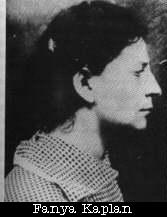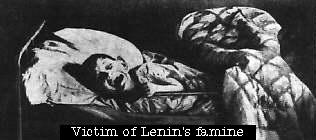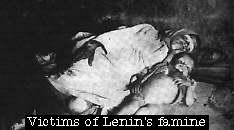"War Communism", the Red Terror, and Lenin's Famine
Almost immediately after they seized power, Lenin's Bolsheviks inaugurated an endless stream of economic decrees and policies. These proved to be disastrous, resulting in a horrific famine, depopulation of the cities, and an enormous decline in living standards. So unpopular were these policies that after they were finally altered in mid 1921, Lenin tried to re-write their history. It was at this point that the Bolsheviks economic policies from 1918-1921 were dubbed "War Communism," and declared to have been a temporary expedient forced upon Lenin's government by wartime conditions. In fact, so-called "War Communism" began before serious fighting erupted, and continued after the Whites had been decisively defeated. It was not a wartime expedient; it was the policy that Lenin wanted to pursue in war or peace. As Pipes explains, "War Communism as a whole was not a 'temporary measure' but an ambitious and as it turned out premature attempt to introduce full-blown communism." (The Russian Revolution) As noted earlier, Lenin's ideas on desirable economic policy were vague at best. So upon taking power, he looked around the world for inspiration; what caught his eye was the "War Socialism" of the German Kaiser. As Paul Johnson notes:
So one might say that the man who really inspired Soviet economic planning was Ludendorff. His "war socialism" certainly did not shrink from barbarism. It employed slave-labourers. In January 1918 Ludendorff broke a strike of 400,000 Berlin workers by drafting tens of thousands of them to the front in "labor battalions." Many of his methods were later to be revived and intensified by the Nazis. It would be difficult to think of a more evil model for a workers' state. Yet these were precisely the features of German "war socialism" Lenin most valued. (Modern Times)The primary features of War Communism were:
- Uncontrolled inflationary printing press finance, ultimately leading to hyperinflation and nationwide reversion to barter
- Near universal nationalization of manufacturing; widespread nationalization of retailing
- Stringent price controls upon and forced requisitioning of agricultural products; state monopoly on grain purchases
- Forced labor for civilians as well as the military
The package fit together quite logically. The tax system had broken down, so the Bolsheviks just turned on the Czar's printing pressing to fund their activities. At the same time, the prices of most goods were fixed, so as the money supply increased without limit, the legal prices became less and less realistic. Rationing cards replaced rubles as the means of acquiring goods. But if money no longer bought goods, then what was the point of working? Hence, the imposition of compulsory labor.
The Bolsheviks' forced labor policies gave new life to the concept of irony. The men who had proclaimed themselves liberators of the workers and denounced the exploitation of labor suddenly discovered the joys of serfdom. Trotsky stood at the theoretical vanguard of the literal proponents of slavery: "It is said that compulsory labor is unproductive. This means that the whole socialist economy is doomed to be scrapped, because there is no other way of attaining socialism except through the command allocation of the entire labor force by the economic center, the allocation of that force in accord with the needs of a nationwide economic plan." Initially the forced labor laws were applied to the (ex-)middle classes, but their application rapidly broadened to include not only workers and peasants but even minors. As Pipes explains:
By late 1918, it became common practice for the Bolshevik authorities to call up workers and specialists for state service exactly as they drafted recruits into the Red Army. The practice was for the government to announce that workers and technical specialists in a specified branch of the economy were "mobilized for military service" and subject to court- martial: those leaving jobs to which they had been assigned were treated as deserters... Efforts to organize industrial labor on the military model could not have worked well in view of the plethora of decrees on this subject, setting up ever new punishments for "labor deserters," ranging from publication of their names to confinement in concentration camps. (The Russian Revolution)
One would expect that the mere suggestion of compulsory labor, let alone its actual imposition, would have branded Lenin and Trotsky as demonic traitors to anyone who purported to care about the plight of workers. Ominously, it did not; Party intellectuals proclaimed the wonders of the new system. "Compulsory labour under capitalism, wrote Bukharin, was quite the reverse of compulsory labour under the dictatorship of the proletariat: the first was 'the enslavement of the working class,' the second the 'self- organization of the working class'." (Paul Johnson, Modern Times) At this point, the reluctance of Communists from Marx to Lenin to precisely explain their proposed policies takes on a new meaning. As the Russian emigre Ayn Rand put it: "Intellectuals? You might have to worry about any other breed of men, but not about the modern intellectuals: they'll swallow anything." (Atlas Shrugged)
As the economy deteriorated, the Cheka waxed ever fatter. After an
July 1918 revolt by SRs, the Cheka turned its guns on fellow
socialists, executing 350 captured SR rebels. One month later, the SR
Fanya Kaplan nearly succeeded in assassinating Lenin.
 Her noble effort unfortunately gave the Cheka the excuse to initiate the
Red Terror, i.e., mass executions of people based not upon their actions
but their class origins and beliefs. As Landauer explains, "The first
conspicuous act of government-ordered reprisals on a large scale without
regard for individual guilt came after the assassination of Michael Uritzky
and the attempt on Lenin's life on August 30. These events were not in
themselves apt to justify measures against the bourgeoisie, for the two
assassins, Kenigiesser and Fania Kaplan, were both members of the Social
Revolutionary party and therefore not "bourgeois." But the minds of the
Soviet leaders were dominated by the theory that Social Revolutionaries and
Mensheviks were tools of the "class enemy," and it appeared logical to the
Bolsheviks to strike at the group which allegedly had inspired the
assassination.
Her noble effort unfortunately gave the Cheka the excuse to initiate the
Red Terror, i.e., mass executions of people based not upon their actions
but their class origins and beliefs. As Landauer explains, "The first
conspicuous act of government-ordered reprisals on a large scale without
regard for individual guilt came after the assassination of Michael Uritzky
and the attempt on Lenin's life on August 30. These events were not in
themselves apt to justify measures against the bourgeoisie, for the two
assassins, Kenigiesser and Fania Kaplan, were both members of the Social
Revolutionary party and therefore not "bourgeois." But the minds of the
Soviet leaders were dominated by the theory that Social Revolutionaries and
Mensheviks were tools of the "class enemy," and it appeared logical to the
Bolsheviks to strike at the group which allegedly had inspired the
assassination.
 Five hundred hostages were shot in reprisal in Petrograd
alone by order of Zinoviev, the head of the local soviet. On September 5,
the people's commissars officially legalized the red terror..."
(European Socialism: A History of Ideas and Movements)
Five hundred hostages were shot in reprisal in Petrograd
alone by order of Zinoviev, the head of the local soviet. On September 5,
the people's commissars officially legalized the red terror..."
(European Socialism: A History of Ideas and Movements)
From then on the Cheka's executions never ceased. The exact number murdered is usually estimated at between 100,000 and 500,000, but the chaotic wartime conditions make the accounting especially difficult. But execution was not the Cheka's only tool; it also pioneered the development of the modern slave labor (or "concentration") camp. Inmates were generally frankly treated as government-owned slaves, and used for the most demanding sorts of work - such as digging arctic canals - while receiving pitifully small rations. As Pipes explains, "Soviet concentration camps, as instituted in 1919, were meant to be a place of confinement for all kinds of undesirables, whether sentenced by courts or by administrative organs. Liable to confinement in them were not only individuals but also 'categories of individuals' - that is, entire classes: Dzerzhinskii at one point proposed that special concentration camps be erected for the 'bourgeoisie.' Living in forced isolation, the inmates formed a pool of slave labor on which Soviet administrative and economic institutions could draw at no cost." (The Russian Revolution) The number of people in these camps according to Pipes was about 50,000 prisoners in 1920 and 70,000 in 1923; many of these did not survive the inhuman conditions.
The mildest manifestation of the Red Terror was the official policy excluding "class enemies" entirely from the wartime rationing system; i.e., legally, it was often impossible for disfavored groups to even purchase food. As Landauer simply puts it: "As a consequence, the average "bourgeois" had only the choice between death and illegal activities." (European Socialism: A History of Ideas and Movements) Bourgeoisie with valued technical training could usually get around these rules, but otherwise their plight - and the plight of their families - was bleak indeed, though naturally far better than the inmates of the slave labor camps.
It is now and only now, when in the regions afflicted by the famine
there is cannibalism and the roads are littered with hundreds if not
thousands of corpses, that we can (and therefore must) pursue the
acquisition of [church] valuables with the most ferocious and merciless
energy, stopping at nothing in suppressing all resistance.
|
So Lenin's government advanced to the next stage: sending the Cheka and the
Red Army to seize grain directly from the peasant. This was ideologically
justified by dubbing peasants who resisted grain as wealthy "kulaks," though
rich and poor alike found themselves staring down the muzzles of the
Cheka's guns. Once again, the resort to ever greater brutality did not
bring the desired results. Minimal food was collected, and the peasants
went into open revolt. Lenin, who in every other matter seemed to be the
master of the temporary compromise, could not control his hatred of the
resisting peasants. He ordered kulaks to be deprived of not only surplus
grain, but even seed grain, while in his speeches he exhorted:
 "Merciless
war against the kulaks! Death to them." Even as the Red Army battled
Kolchak and Denikin, they waged a less visible civil war with the peasants.
By most estimates
several hundred thousand peasants were killed as a result of this so-called
"Bread War" - as usual, the Red Army and the Cheka executed not only
captured rebels, but often families, friends, or entire villages associated,
however vaguely, with counter-revolution.
"Merciless
war against the kulaks! Death to them." Even as the Red Army battled
Kolchak and Denikin, they waged a less visible civil war with the peasants.
By most estimates
several hundred thousand peasants were killed as a result of this so-called
"Bread War" - as usual, the Red Army and the Cheka executed not only
captured rebels, but often families, friends, or entire villages associated,
however vaguely, with counter-revolution.
The peasants had numbers on their side, and many soldiers were reluctant
to fight them, but the government's superior organization ultimately gave
them victory over the peasants.
 But the victory was hollow, for after
the fruit of their labor had been seized, farmers generally decided there
was no point in growing a surplus. Moreover, since seed grain was often
taken, many peasants were unable to grow surplus crops even if they wished.
When the perverse incentives of price controls and expropriation were
mixed with a drought, the result was one of the great disasters of the
century: the Russian famine of 1921.
Official Soviet reports admitted that
fully 30 million Soviet citizens were in danger of death by
starvation. The White forces shared little of the blame: as Pipes notes,
the Civil War was essentially over by the beginning of 1920, but Lenin
continued his harsh exploitation of the peasantry for yet another year.
But the victory was hollow, for after
the fruit of their labor had been seized, farmers generally decided there
was no point in growing a surplus. Moreover, since seed grain was often
taken, many peasants were unable to grow surplus crops even if they wished.
When the perverse incentives of price controls and expropriation were
mixed with a drought, the result was one of the great disasters of the
century: the Russian famine of 1921.
Official Soviet reports admitted that
fully 30 million Soviet citizens were in danger of death by
starvation. The White forces shared little of the blame: as Pipes notes,
the Civil War was essentially over by the beginning of 1920, but Lenin
continued his harsh exploitation of the peasantry for yet another year.
 Moreover, the areas under White control had actually built up a food
surplus. The horrific famine of 1921 was thus much less severe in
1920, because after the reconquest of the Ukraine and other White
territories, the Reds shipped the Whites' grain captured grain north to
Petrograd, Moscow, and other cities with less hunger but more political
clout. Low estimates on the deaths from this famine are about
3 million; high estimates go up to 10 million - which would probably have
been much higher if not for foreign relief efforts which Lenin had the
good sense to permit. For perspective, the last severe famine in Russia
hit in 1891-92, and cost about 400,000 lives.
Moreover, the areas under White control had actually built up a food
surplus. The horrific famine of 1921 was thus much less severe in
1920, because after the reconquest of the Ukraine and other White
territories, the Reds shipped the Whites' grain captured grain north to
Petrograd, Moscow, and other cities with less hunger but more political
clout. Low estimates on the deaths from this famine are about
3 million; high estimates go up to 10 million - which would probably have
been much higher if not for foreign relief efforts which Lenin had the
good sense to permit. For perspective, the last severe famine in Russia
hit in 1891-92, and cost about 400,000 lives.
Needless to say, Lenin had no plans to respect the freedom of religion.
But until the famine, most of the persecution of religion appears to have
been taken on local initiative.
 Most religious property was ordered
expropriated, although in fact clergymen usually continued to occupy and
use their church buildings. Parents lost the right to give their children
religious education - although again, during the Civil War years, this does
not seem to have been enforced. (Interestingly, while the state subsidies
to the church greatly declined, the Orthodox Church under Lenin essentially
remained a bureau of the state). Serious government persecution of the
Orthodox Church began with the famine, which gave Lenin the
chance to bring the Orthodox Church into line.
He demanded that the Church hand over
valuable relics to help famine victims (or so he said). The Church
resisted, resulting in around 8000 executions of persons resisting the
confiscation of relics. Similar but milder persecution began against
Jews, Catholics, and to a lesser extent, Muslims. (These religions, however,
had less to lose than the Orthodox Church, because they had no subsidies
for the Bolsheviks to cut off).
Most religious property was ordered
expropriated, although in fact clergymen usually continued to occupy and
use their church buildings. Parents lost the right to give their children
religious education - although again, during the Civil War years, this does
not seem to have been enforced. (Interestingly, while the state subsidies
to the church greatly declined, the Orthodox Church under Lenin essentially
remained a bureau of the state). Serious government persecution of the
Orthodox Church began with the famine, which gave Lenin the
chance to bring the Orthodox Church into line.
He demanded that the Church hand over
valuable relics to help famine victims (or so he said). The Church
resisted, resulting in around 8000 executions of persons resisting the
confiscation of relics. Similar but milder persecution began against
Jews, Catholics, and to a lesser extent, Muslims. (These religions, however,
had less to lose than the Orthodox Church, because they had no subsidies
for the Bolsheviks to cut off).
Can Lenin and his associates be held morally culpable for the deaths of these millions of famine victims? If the famine were a natural catastrophe, this would be unreasonable. But the famine was largely man-made, the result of draconian price controls and requisitioning. Most of the evidence is that Lenin and his associates knew the probable results of their agricultural policies, but were willing to take the risk: according to Pipes, Lenin repeatedly said that he would sooner the whole nation die of hunger than allow free trade in grain. In short, Lenin and his comrades knew with substantial certainty that their policies would cause widespread death from starvation. Under any sensible definition of murder, this makes Lenin the murderer of millions.
|
| ||

| ||
|
|